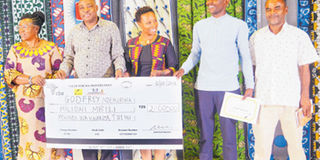The Ebrahim Hussein Poetry Prize

Godfrey Ndekirwa this year’s winner (second right) stands together with judges. PHOTOI ELIZABETH TUNGARAZA
What you need to know:
- Ephraim Hussein poetry prize is one of Tanzania's most renowned poetry recognition awards where authors in Kiswahili writings are given a platform to share their stories with the rest of the public.
Unlike most other genres of writing, poetry was meant to be read or told out loud. “Because a major component of poetry is rhythm, reading it out loud enables the reader to become more aware of language dynamics: where to pause, where to speed up, where to put emphasis. It forces the reader and/or writer to employ all of his or her powers of persuasion,” reads theodysseyonline.com
Poetry helps children and adults to learn the art of creative expression, which most find highly lacking in the new-age educational landscape. In essence, poetry gives them a great tool for developing one’s self.
In recognising the art of creative expression through poetry, the Ebrahim Hussein Poetry Prize this year held the fourth competition in its endeavour to promote poetry, celebrate talent and nurture Kiswahili language.
The annual poetry competition, which reached its finals in Dar es Salaam recently, saw Godfrey Ndekirwa, a university graduate, going home with Sh2m cash prize, triumphing over other 200 contestants from different parts of Tanzania. Bashiru Abdallah, who took the first runner up position, went home with Sh1.7m while the second runner up, Bimkubwa received Sh1.3m cash prize.
Godfrey, who won the first prize with his poem entitled: “Sikio lisilo dawa” , and the second runner up, Bimkubwa, whose poem entitled: “Moyo kichaka cha mtu” grabbed the attention of the judges. For them, the competition was fairly challenging and every participant had an equal chance to win the top prize.
Speaking at the event, the Dar es Salaam City Mayor, Isaya Mwita Charles, who graced the occasion, urged participants to value Kiswahili language and use it wherever they can. ”President John Magufuli uses Kiswahili even in regional meetings.
This helps in boosting the status of the language. Other leaders should follow in his footsteps,” he said. The City Mayor commended the Ebrahim Hussein Poetry Prize for its vision to promote the use of Kiswahili through poetry.
Speaking to Success, Safarani Seushi , the Project Coordinator for the Ebrahim Hussein Poetry Prize (EHPP) says EHPP was established in 2013 as per the wish of the late Gerald Belkin (1940 – 2012), a Canadian filmmaker who worked and lived in Tanzania in the 1960s. “Belkin travelled and lived in the rural areas of Tanzania, and collaborated with Ebrahim Hussein to record life in Tanzania Ujamaa villages. He believed that Tanzanian peasants, though living in hardship, were capable of creating a democratic and prosperous future for themselves,” she says.
According to her, Belkin observed the cultural life, learned the Kiswahili language, and was impressed by its literature, especially poetry. He discovered that Tanzania had many creative poets who needed to be promoted and publicized.
He planned to create a Fund for that purpose, and proposed that the Fund should be named after his friend and renowned filmmaker and playwright, Professor Ebrahim Hussein. “Unfortunately, Belkin passed away before he could realize his dream. Nevertheless, he left instructions that a Swahili Poetry Fund should be established to promote Swahili poets. He bequeathed a sum of 50,000 Euros (approximately $57,000 ) as seed money for the purpose. The Poetry Fund is managed by Tanzania Growth Trust.”
EHPP’s vision is to promote poetry, celebrate talent and nurture Kiswahili; and a mission to contribute to the promotion of Kiswahili poetry, and the recognition of emerging poets through free and transparent annual poetry competitions that are open for all to participate.
The first round of the competition took place in 2014, and subsequently in 2016 and 2017. In 2018, the competition was opened in June and the award ceremony took place this October.
Previous winners
There have been 3 winners so far, and these are Esther Karin Mngodo (2014), Idd Mwimbe (2016) and Nusura Khaji (2017). The winner for this year, Godfrey Ndekirwa, was announced on 6th October during an award ceremony held in Dar es Salaam.
About Ebrahim Hussein
Ebrahim Hussein (born 1943) is a Tanzanian writer. His first play, Kinjeketile (1969), written in Swahili is considered “a landmark of Tanzanian theater.” The play soon became one of the standard subjects for Kiswahili exams in Tanzania and Kenya. By 1981, it had already been reprinted six times.
Other plays written by Hussein include: Mashetani (1971), an overtly political play; Jogoo Kijijini (1976), an experiment in dramatic performance; and Arusi (1980), in which Hussein expresses disillusionment with the Tanzanian political theory Ujamaa.




